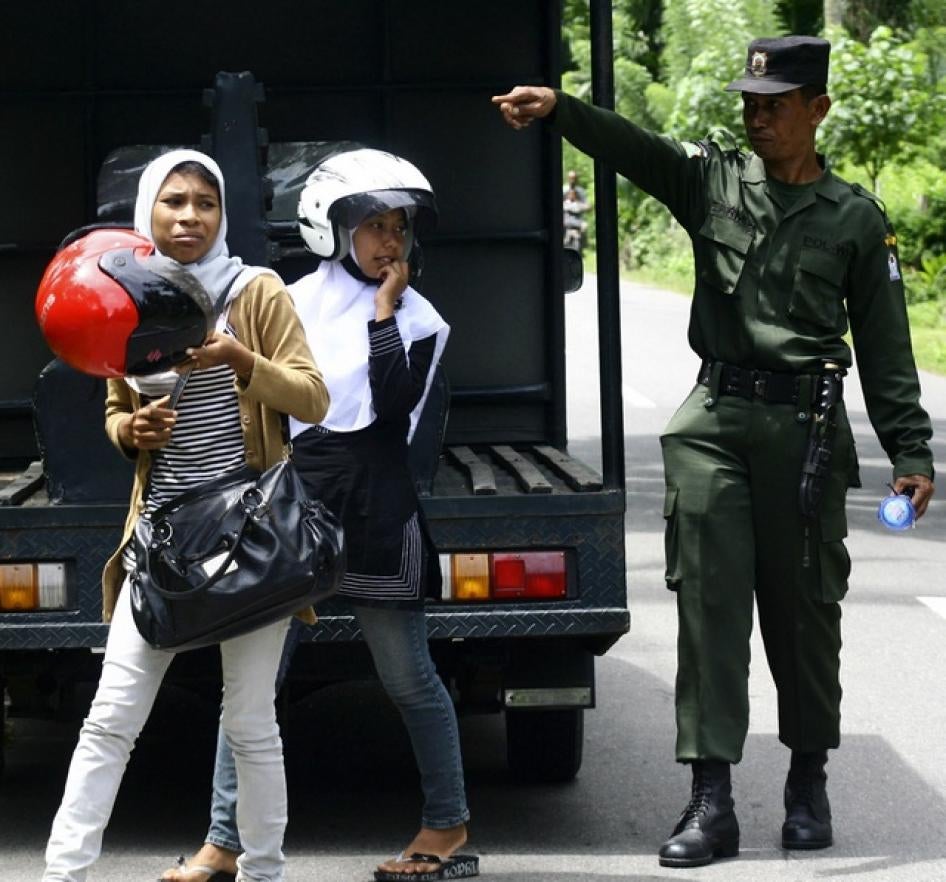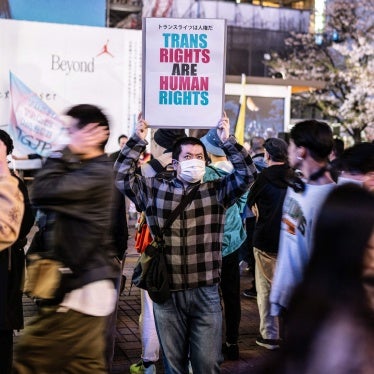(New York) – – Indonesian authorities should immediately and unconditionally release two women arrested on suspicion of being lesbians in Aceh province, Human Rights Watch said today. The arrests under Islamic bylaw are contrary to the rights to nondiscrimination and fundamental freedoms under Indonesia’s constitution and international human rights law.
On September 28, 2015, the Wilayatul Hisbah, or Sharia police, arrested the two women identified as AS, age 18, and N, age 19, when the police saw the pair hugging in a public place in Banda Aceh, the provincial capital. A police official told reporters that they “suspected the women were lesbians.”
“The arrest of two women in Aceh for everyday behavior is an outrageous abuse of police power that should be considered a threat to all Indonesians,” said Graeme Reid, lesbian, gay, bisexual, and transgender (LGBT) rights program director at Human Rights Watch. “The Indonesian government needs to press Aceh to repeal its discriminatory new by-laws.”
Sources in Aceh said the two women remain in police custody, where officers are pressuring them to contact their families so that they may be released into their custody.
Aceh’s criminal code, which went into effect in September 2014, prohibits lesbianism and sodomy. These offenses do not exist in the Indonesian national criminal code. The Acehnese by-laws extend Sharia, or Islamic law, to non-Muslims, and the criminal code permits punishments of 100 lashes and 100 months in prison for consensual same-sex sex acts.
Under national legislation stemming from a “Special Status” agreement brokered in 1999, Aceh is the only one of Indonesia’s 34 provinces that can legally adopt by-laws derived from Sharia. Human Rights Watch opposes all laws or government policies that are discriminatory or otherwise violate basic rights.
Aceh’s parliament drafted the Principles of the Islamic By-law, while the province’s official Islamic Affairs Office drafted the Islamic criminal code. These by-laws apply not only to Aceh’s predominantly Muslim population, but to about 90,000 non-Muslim residents, most of them Christians and Buddhists, as well as domestic and foreign visitors to the province.
The International Covenant on Civil and Political Rights (ICCPR), which Indonesia ratified in 2005, protects the rights to privacy and family (article 17), and freedom of religion (article 18) and expression (article 19). The covenant prohibits discrimination on the basis of sex, religion, and other status such as sexual orientation (article 2). It also prohibits punishments such as whipping that could amount to torture or cruel and inhuman punishment (article 7). The Free Aceh Movement, which made the 2005 peace agreement in Helsinki with the Indonesian government, is bound by the ICCPR (article 50) and had also agreed to adhere to the ICCPR in drafting the region’s laws.
In 2010, the head of the Wilayatul Hisbah told the Indonesian media that, in his opinion, homosexuality is forbidden in Aceh whether or not a local law prohibiting it exists. A 2014 United Nations report said that during the previous five years, “the situation for LGBT residents of Aceh and other marginalized communities has deteriorated.”
Aceh’s provincial legislature should urgently repeal the discriminatory by-laws, Human Rights Watch said. In the meantime, Governor Zaini Abdullah should stop the province’s Sharia police from arresting and detaining people suspected of “crimes” such as consensual same-sex relations.
“Discriminatory laws and homophobic public rhetoric by officials create a climate of fear that stalks LGBT people in Aceh,” Reid said. “There is no place in Indonesia for such laws and government behavior.”








